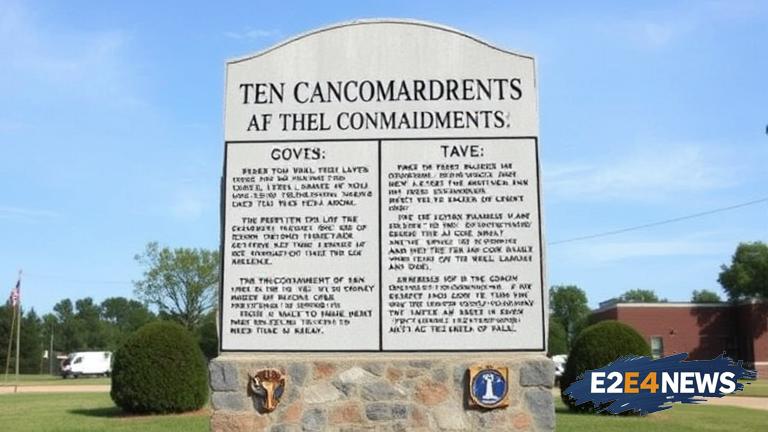The American Civil Liberties Union (ACLU) has filed a motion to amend a lawsuit against the Conway School District in Arkansas, seeking to add the district to a existing lawsuit challenging the constitutionality of a Ten Commandments monument on school property. The lawsuit, which was originally filed in 2022, argues that the monument violates the Establishment Clause of the First Amendment, which prohibits the government from promoting or endorsing a particular religion. The ACLU claims that the monument, which is located on the grounds of a public school, constitutes an unconstitutional endorsement of Christianity. The organization argues that the monument’s presence on school property creates a hostile environment for students who do not subscribe to the Christian faith. The Conway School District has defended the monument, arguing that it is a historical and cultural artifact that does not promote or endorse any particular religion. However, the ACLU disputes this claim, pointing out that the monument is a nearly exact replica of a similar monument that was erected on the grounds of the Arkansas State Capitol building. The ACLU also argues that the monument’s presence on school property is not merely a passive display, but rather an active promotion of Christianity. The organization points to statements made by school officials and local politicians, which suggest that the monument is intended to promote Christian values and principles. The lawsuit is part of a broader effort by the ACLU to challenge the constitutionality of Ten Commandments monuments on public property across the United States. The organization has filed similar lawsuits in other states, including Oklahoma and Texas. The ACLU argues that these monuments are often erected with the intention of promoting Christianity, and that they create a hostile environment for students and citizens who do not subscribe to the Christian faith. The lawsuit against the Conway School District is likely to be closely watched by civil liberties advocates and religious freedom groups. The case has the potential to set a significant precedent for the display of religious symbols on public property. The ACLU is seeking a court order that would require the Conway School District to remove the monument from school property. The organization is also seeking damages and attorneys’ fees. The case is currently pending in federal court, and a decision is expected in the coming months. The ACLU has a long history of challenging the constitutionality of Ten Commandments monuments on public property. The organization has argued that these monuments are often erected with the intention of promoting Christianity, and that they create a hostile environment for students and citizens who do not subscribe to the Christian faith. The ACLU has also argued that these monuments are often funded with public money, which further reinforces the appearance of government endorsement. The organization has pointed to a number of cases in which courts have ruled that Ten Commandments monuments on public property are unconstitutional. For example, in 2005, the US Supreme Court ruled that a Ten Commandments monument on the grounds of the Texas State Capitol building was unconstitutional. The court held that the monument constituted an unconstitutional endorsement of Christianity, and that it created a hostile environment for citizens who did not subscribe to the Christian faith. The ACLU has also pointed to cases in which courts have ruled that the display of religious symbols on public property is permissible, as long as the display is not intended to promote or endorse a particular religion. For example, in 2019, a federal court in Oklahoma ruled that a Ten Commandments monument on the grounds of a public school was permissible, because it was part of a larger display of historical and cultural artifacts. However, the ACLU argues that the monument in Conway is different, because it is a standalone display that is intended to promote Christian values and principles. The organization argues that the monument’s presence on school property creates a hostile environment for students who do not subscribe to the Christian faith, and that it constitutes an unconstitutional endorsement of Christianity. The lawsuit against the Conway School District is likely to be closely watched by civil liberties advocates and religious freedom groups. The case has the potential to set a significant precedent for the display of religious symbols on public property, and it could have implications for similar cases across the United States.
